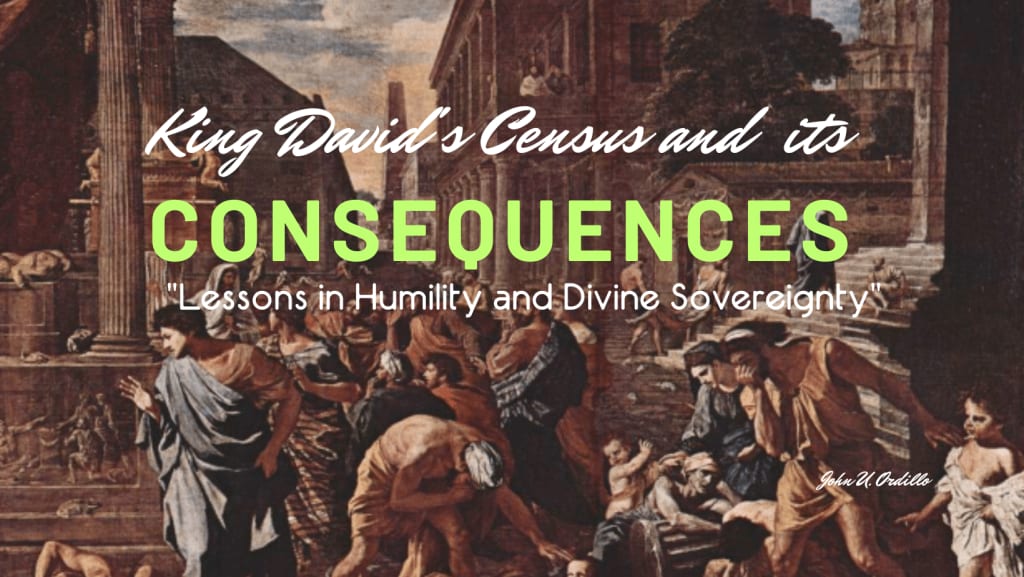KING DAVID'S CENSUS AND ITS CONSEQUENCES
“Lessons in Humility and Divine Sovereignty”

Introduction:
In biblical history, Samuel 24 and 1 Chronicles 21. King David of Israel holds a prominent position, renowned for his courage, victories, and passionate devotion to God. However, even great leaders are susceptible to making mistakes, and one such misstep was David’s decision to conduct a census of the people. This essay delves into the consequences of David’s census, exploring the potential motives behind his actions, the displeasure of God, and the subsequent repentance that led to the cessation of the plague. The story of David’s census serves as a timeless lesson in humility, trust, and the recognition of divine sovereignty.
The Census and Motives Rooted in Pride:
Against the counsel of his advisors, David ordered a census of the people of Israel and Judah. While the specific reason for God’s displeasure is not explicitly mentioned in the biblical account, it can be inferred that David’s motives were rooted in pride and arrogance. The census may have reflected a lack of trust in God’s providence, relying on human strength and numbers instead. Rather than recognizing God’s covenant and divine protection, David sought reassurance in the size of his army and the extent of his domain.
Furthermore, David’s insistence on conducting the census despite Joab’s warning suggests that he succumbed to the allure of pride. Joab questioned the purpose of the census, implying that it went against the principles of humble leadership. David’s desire to count and quantify the people under his rule seemingly stemmed from a yearning to boast about his own power and accomplishments. This act of arrogance and self-reliance set the stage for divine intervention and subsequent consequences.
God’s Displeasure and the Plague:
In response to David’s census, God became angry and sent a plague upon the land. The precise nature of God’s displeasure is not explicitly stated, but it can be understood as a consequence of David’s misplaced trust and his failure to acknowledge God’s sovereignty. By relying on a census to assess his strength, David showed a lack of faith in God’s promises and providential care. The plague that ensued, resulting in the deaths of many Israelites, served as a punishment and a stark reminder of the consequences of David’s actions.
Repentance, Forgiveness, and the Ceasing of the Plague:
Recognizing his sin, David responded with genuine remorse and sought forgiveness from God. He built an altar and offered sacrifices as a demonstration of his repentance. It was at this point that God halted the devastating plague. David’s response to the consequences of his actions highlights the importance of humility and the recognition of one’s fallibility before God. By acknowledging his transgressions and seeking reconciliation, David exemplified the qualities of a true leader who understands the significance of divine forgiveness.
Lessons in Humility and Divine Sovereignty:
The story of David’s census and its consequences provides valuable lessons that transcend time and resonate with people of various eras. It serves as a reminder of the perils of pride and the pitfalls of self-reliance. David’s actions underscore the necessity of humility in leadership, highlighting the importance of trusting in God’s providence rather than human achievements. Moreover, the story emphasizes the profound truth of divine sovereignty and the need for obedience to God’s commands.

Life Applications:
When we undermine or fail to fully trust in God’s power and sovereignty in our lives, we risk experiencing the consequences of our actions. The Bible provides several passages that illustrate the outcomes of relying on our own understanding and disregarding God’s wisdom and guidance.
Proverbs 3:5–6 (NIV) advises, “Trust in the LORD with all your heart and lean not on your own understanding; in all your ways submit to him, and he will make your paths straight.”
This passage emphasizes the importance of wholeheartedly trusting in God rather than relying solely on our limited human understanding. When we undermine God’s capabilities and rely on our own wisdom, we are susceptible to making choices that can lead to undesirable outcomes and unfulfilled paths.
The story of King Nebuchadnezzar in Daniel 4 serves as a powerful example. Nebuchadnezzar, the king of Babylon, allowed pride to consume him, boasting about his accomplishments and attributing them solely to his own power.
As a result, God humbled him and caused him to live like a wild animal, eating grass and dwelling in the fields until he recognized that God alone is sovereign. Only after his acknowledgment of God’s authority did Nebuchadnezzar’s sanity and kingdom return.
In the New Testament, Jesus tells the parable of the rich fool in Luke 12:16–21. The rich man accumulated great wealth and, rather than acknowledging God’s provision, selfishly planned to hoard his possessions and live a life of ease.
However, God called him a fool because he failed to recognize that his life was not solely dependent on his wealth but on God’s providence. The man’s life was abruptly taken from him, and his riches were rendered meaningless.
These biblical examples illustrate the consequences of underestimating God’s power and relying solely on our own abilities. When we undermine God, we can experience spiritual emptiness, the loss of blessings, and the ultimate futility of our pursuits.
Trusting fully in God, on the other hand, brings forth numerous benefits. Psalm 37:5 (NIV) encourages, “Commit your way to the LORD; trust in him, and he will act.”
When we place our trust in God, we open ourselves up to His guidance, protection, and provision. We can experience peace, direction, and the fulfillment of His promises.
When we undermine what God can do in our lives and rely solely on our own understanding and abilities, we risk encountering negative consequences. The Bible warns us about the perils of pride, self-reliance, and neglecting God’s guidance. On the contrary, when we fully trust in God and submit to His will, we invite His blessings, guidance, and transformative power into our lives. Trusting in God wholeheartedly is a reminder of our dependence on Him and the wisdom of acknowledging His sovereignty in all aspects of our lives.
Conclusion:
King David’s decision to conduct a census without seeking God’s guidance was a lapse in judgment rooted in pride and arrogance. The ensuing consequences of a devastating plague were a stark reminder of the importance of humility, trust, and the recognition of divine sovereignty. David’s repentance and seeking of forgiveness showcased the path to reconciliation and cessation of the plague. The story of David’s census stands as an enduring lesson for leaders and individuals alike, reminding us to cultivate humility, trust in God’s providence, and acknowledge our dependence on divine guidance rather than relying solely on our own strength. By internalizing these lessons, we can strive to become better leaders and individuals who prioritize humility, recognize the consequences of our actions, and seek reconciliation with God.
By: Pastor John U. Ordillo
To read more click the link below:
About the Creator
JOHN U. ORDILLO
M.A. in Pastoral Administration Asian Seminary of Christian Ministries
Former Jr. Planner/Design Engineer Norconsult Telematics Saudi Arabia
Former Outside Plant Engineer Saudi Engineering Group International






Comments
There are no comments for this story
Be the first to respond and start the conversation.